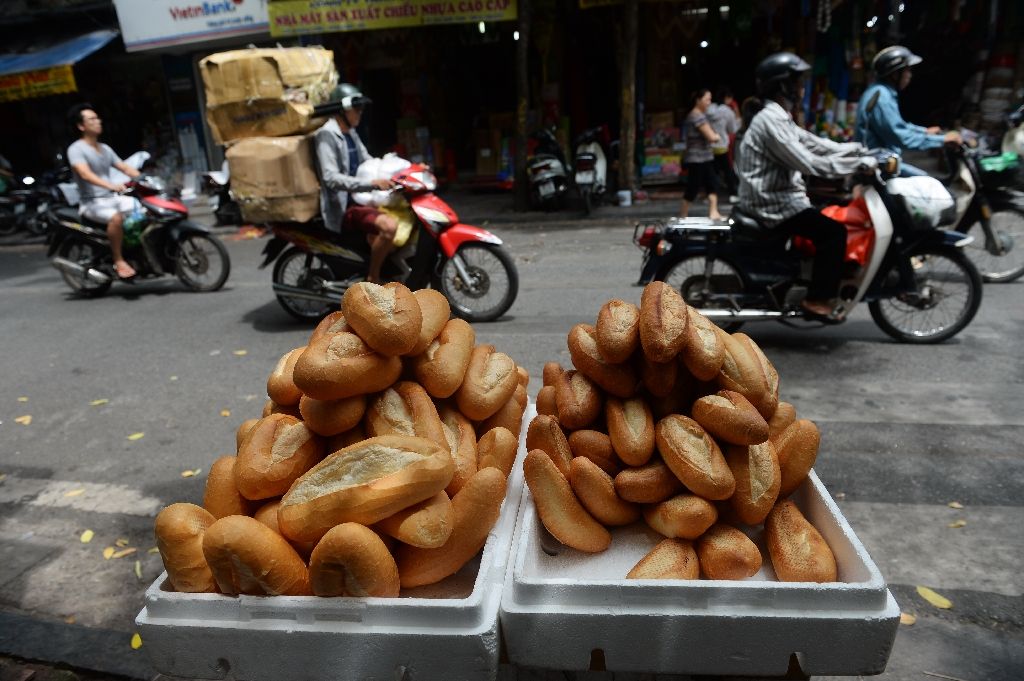[ad_1]
It has been more than six decades since the end of French colonial rule in Vietnam, but when President Francois Hollande arrives this week he’ll struggle to avoid a quintessential legacy of his country’s rule: the baguette.
Smeared with pate and loaded with fresh coriander and cucumber, or just enjoyed with a pat of fresh butter, “banh mi” are a delicious symbol of Vietnam’s lasting links with its former occupiers.
“The French were very proud of banh mi. I think French cuisine has had a lot of influence on Vietnamese cuisine,” baker Nguyen Ngoc Hoan told AFP from his busy boulangerie in Hanoi’s French Quarter.
Hoan started baking banh mi -– which refers to plain bread or the popular “petit pain” loaded with meat, vegetables or fried egg — in 1987 and five years later got a stint at the bakery in the storied Metropole hotel, built by the French at the turn of the 20th century.
The sandwich has become a foodie favourite in hipster enclaves around the globe, sold from food trucks and sipped with craft beer in both its classic form and a flurry of new varieties.
Hoan’s father was also a baker but discouraged his son from following in his floured footsteps.
“The baking profession chose me, it was not my decision,” Hoan said, speaking in front of a wall of ovens as his workers tirelessly knead dough nearby.

An employee prepares to bake croissants at ‘Hoan Boulangerie’ in Hanoi.
He started his career baking what he called Vietnamese bread -– airy on the inside, crusty on the outside -– but after training with a French baker in Shanghai decided to switch to the denser French-style.
Now, he churns out thousands of warm baguettes daily, along with croissants, creme caramel and homemade pate.
‘Petit pain’
French bread was first made in Vietnam to feed hungry soldiers in Indochina, France’s empire which spanned much of Southeast Asia from 1858 to its crushing defeat in the Dien Bien Phu battle in Vietnam in 1954.
But the French became known for more than food, gaining a brutal reputation for crushing anti-imperialist movements and putting Vietnamese laborers to work in gruelling conditions on rubber plantations, while heavily taxing citizens during periods of drought and famine.
Most French who came to Vietnam weren’t interested in low-level jobs like baking.
To fill the gap, Chinese and Vietnamese worked in boulangeries — often hidden away in the back so customers wouldn’t know who was baking their bread.

Local Vietnamese cooks used meat scraps and unused bones from French butchers to create pho – the national dish of beef or chicken noodle soup.
“By 1910, little baguettes or ‘petit pain’ were sold in the street to (Vietnamese) people who were on their way to work,” according to Erica Peters, food historian and author of “Appetites and Aspirations in Vietnam”.
In the years that followed, meat, vegetables or fish appeared in the bread — precursors to the modern-day banh mi sold all over Hanoi, a city rife with French colonial architecture, bistros and cafes.
Other culinary influences leaked in too.
Local cooks used meat scraps and unused bones from French butchers to create pho — the national dish of beef or chicken noodle soup, according to Peters. Coffee and creme caramel are some of the other French culinary leftovers.
The ubiquity of those influences will not be lost on President Hollande, who arrives late Monday for talks with Vietnam’s leadership and French businessmen.
Hybrid cuisine
Today, Vietnam’s commercial capital Ho Chi Minh City is dotted with chic cafes serving croque monsieur and macarons at Paris prices.

An employee prepares a ‘banh mi’ for sale at ‘Banh Mi Phuc’ restaurant in Hanoi.
But the $1 banh mi still rules Hanoi’s street food scene.
It is so engrained in Vietnam’s culinary culture that few draw its lineage back to France.
“I don’t know and don’t care whether it’s French, I just serve it like this,” said Nguyen Thi Duc Hanh, sitting in front of her shop as the lunchtime rush begins.
She sells hundreds per day and keeps her menu simple: banh mi served with pate and a fried egg, beef steak or her very own version of “boeuf au vin” made with local spices.
One of her regulars, Nguyen Van Binh, said he has been eating banh mi for 50 years, and unlike Hanh, thinks of it as a hybrid dish.
“Banh mi came from France but it was changed and adapted to suit Vietnamese tastes,” said Binh, before digging into his fried egg and pate served with a crusty roll.
[ad_2]
Source link
